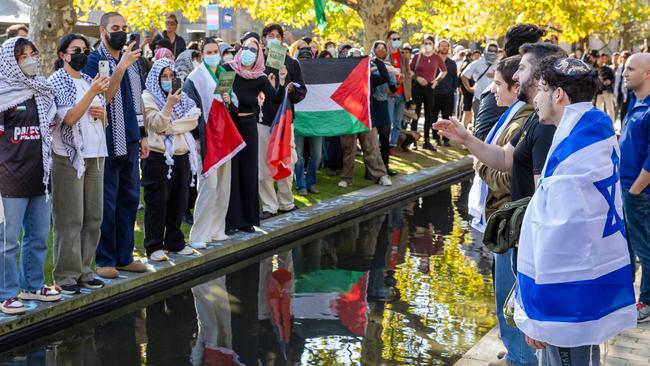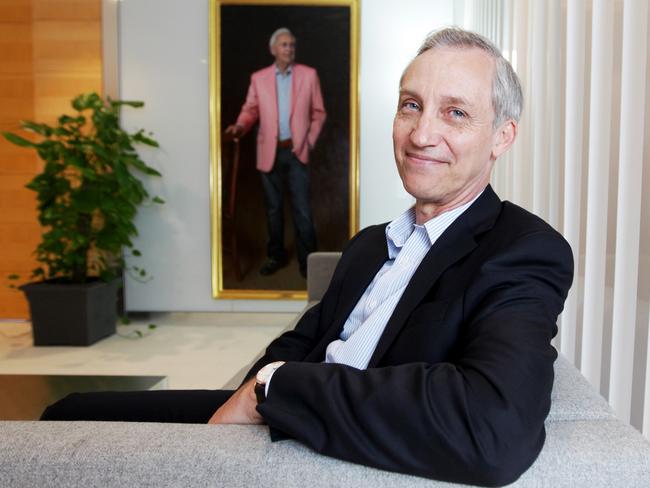‘If I were Jewish on campus, I would be genuinely scared’, says Simon Haines
The Ramsay Centre for Western Civilisation is out of the news and quietly succeeding. But children shouting ‘intifada’ on campus shows it still has much work to do.

The gathering was cartoonish and creepy. Allegedly learned people resorted to slogans. One academic said the Ramsay partnership was an exercise in “aggressive racial and cultural supremacism”. One PhD candidate said the Ramsay Centre was “structurally, institutionally, morally and epistemically violent to other knowledges”. There was zero debate. Nil nuance. Even less, if that is possible, curiosity.
For two dismal hours, the speakers equated right-wing as evil, white with bad, Western civilisation with violence – and the Ramsay Centre with all three.
I was there. It was like visiting a madhouse – except that at a proper madhouse there is at least a cacophony of disagreement.
Not much has changed. Campuses aflame with ignorance. Intolerance towards different ideas. Identity politics galore. And weak leadership in the vice-chancellors’ offices another consistent thread. In the last week alone, little children were photographed at a protest on the Sydney University campus chanting “intifada”. Students are openly siding with Hamas.
The big difference between 2018 and 2024 is that the Ramsay Centre for Western Civilisation is out of the news and quietly succeeding. Not at inculcating some right-wing agenda on campuses but teaching students to think for themselves, to understand the finest traditions of intellectual curiosity and to enjoy the dynamism of debate.
It’s mostly down to the leadership of Simon Haines. The outgoing chief executive of the Ramsay Centre for Western Civilisation took Paul Ramsay’s idea to promote the teaching of fundamental tenets of Western civilisation and created a fully funded degree in the great books of Western civilisation.

Back in the early days, the Australian National University wouldn’t have a bar of it. Sydney University played silly buggers and lost the chance to offer students full scholarships for this groundbreaking new degree about our greatest books.
That is their loss. Instead, an intellectual renaissance of sorts is unfolding at three other universities where university leaders understand that learning from the great books opens our minds.
Haines is the humanities professor from central casting, back when learning about Western civilisation was a core concern of universities. He is quiet, understated, learned. His mind is as broad and deep and complex as the period of our history that fascinates him – 3000 years or so from the ancient Greeks to, well, pick a modern writer, poet, philosopher.
“In reading these (great) books properly, without preconceptions, without the usual set of modern prejudices, we are almost literally grappling with the condensed essence of a great mind, and growing your own in the process,” Haines said to a room filled with more than 500 people at The Road Ahead conference in Fremantle a few weeks ago. “As Lionel Trilling said many years ago, it isn’t so much that we read these books, as that they read us.”
Haines’s speech was mesmerising. His success equally so. The Ramsay Centre has partnered with three universities: the University of Queensland, the University of Wollongong and the Australian Catholic University. These eight-year partnerships, each worth $50m, are the most generous in the humanities in Australian history. More than 350 young students are studying the great books and another 81 postgraduate students have received scholarships worth up to $90,000 a year to study at world-class universities overseas.
Among the postgraduate scholars, one PhD candidate researching high-achieving schools in socially disadvantaged areas wants to help close the achievement gap for disadvantaged students. A newly qualified doctor wants to increase access to surgical, obstetric and critical healthcare in Australia’s Indigenous communities and in equally difficult communities in the Asia-Pacific. A former teacher wants to help create development policies to support Australia’s coalmining regions through the energy transition. The only thing scary about this is the noble ambition of these young Australians.
Speaking to Inquirer as he prepares to leave his role at Ramsay next month, Haines laughs at those early, silly responses from ANU and Sydney University in 2018. “They thought this was some kind of right-wing political enterprise,” he says. “I’m a lifetime humanities scholar. As if I would do that. And the other funny thing is, I don’t know what a right-wing curriculum is. Is it the collected works of Ayn Rand?”
Haines studied at the ANU, then taught there, before becoming head of English and later humanities. He admits it hurt when his alma mater turned its back on a great books degree. “I was very disappointed,” he says. “There was a lot of misunderstanding about what we were trying to do.”
Ramsay’s opponents used the presence of John Howard and Tony Abbott on the Ramsay board as reasons to propagate the lie that the new degree was a right-wing endeavour.
“The main influences of our course are Plato and Aristotle and Shakespeare and so on,” Haines says with a smile.
Haines is a polite man. He will say only that there were equal numbers of supporters and opponents. Alas, the latter had the loudest, and therefore the last, say.
In fact, there was studied ignorance to the visceral reaction by some at ANU and at Sydney. Insiders suggest ANU vice-chancellor Brian Schmidt, an otherwise brilliant Nobel laureate of science, had little clue about the intellectual offering from Ramsay.
Before he died suddenly in 2014, businessman Paul Ramsay told close friends, including Abbott, that he wanted a good part of his fortune to be spent on ensuring young Australians learned about Western civilisation.
Howard, the inaugural chairman of the Ramsay Centre, tells Inquirer these early reactions “demonstrated that we were not engaged in a phantom fight”.
Michael Easson, a former trade union leader and successful businessman, believes “things are worse” on campus today than when he joined the Ramsay board five years ago. He’s speaking to Inquirer on the same day Beatrice Tucker, a student representative on ANU’s student association last year and an organiser of the pro-Palestine encampment on campus, said: “Hamas deserves our unconditional support.” Hamas is a designated terrorist organisation.
Last week, little children chanted “intifada” at what organisers described as a “kids excursion” to the pro-Palestine encampment at Sydney University. One young girl was given a megaphone and was filmed shouting: “From the river to the sea, Palestine will be free” – a slogan used by terrorists to justify the removal of Jews from the River Jordan to the Mediterranean Sea.
These are signs of sick universities.
“Paul had a notion that the education he received from the Jesuits, the inculcation of respect and understanding and sympathy for Western traditions, not in a worshipful and uncritical way but in a thoughtful way, was worth preserving, defending,” says Easson. “He (Ramsay) wasn’t a guy reading Machiavelli’s The Prince and debating what all that meant. He wasn’t a scholarly individual, but he had a common man’s instinct for what was good and deserving in our culture and worth defending.”
Three years later, in 2017, the Ramsay Centre for Western Civilisation was established, leaving Haines and his team to turn a sketchy idea from the wealthy late businessman into a reality.
Haines has done a “first-class” job, says Howard. “I am sorry he’s leaving,” Abbott tells Inquirer, describing Haines as “a man who’s absolutely at the top of his game full of energy and enthusiasm”.
Haines wants to write more books. He reckons there are a few in him. He will leave behind an organisation flushed with success.
“Simon has done an astonishing job,” says Easson, describing Ramsay as akin to a start-up, and Haines’s legacy as “an incredibly impressive achievement”. “Everyone involved in Ramsay will always be proud to say we were there at the creation.”
When he replaced Kim Beazley on the Ramsay board, Easson wrote a piece to explain – presumably to his centre-left doubters – why he joined: “What Ramsay wants to achieve is this: through the study of works of classic significance the great questions are illuminated: What does it mean to be human? What is the good life – and the good society? What are the limits to individual loyalty to the state? And limits to human exploitation of the universe?
“Far from being a businessman’s fantasy to subvert universities to a narrow frame of thinking, the Ramsay Centre is a radical endeavour to invigorate a non-utilitarian spirit of fearless scholarship. That’s why I joined,” Easson wrote.
That the former unionist felt it necessary, or useful, to explain himself demonstrates the problem. Tribal thinking undermines intellectual curiosity.
Haines is troubled by our conformist age, by the “coercive conformism” especially on campus, turbocharged by social media. He tells students at the beginning of each year “this is your opportunity to not be conformist”. He says: “I’m seriously worried about free speech on campus right now, and for the safety of some individuals. Some of what we’re seeing in the US and here, like at Sydney Uni at the moment, is really frightening. If I were Jewish on campus, I would genuinely be scared.”
It’s easy to be “presentist” about current protests, Haines says. He’s almost old enough to remember Kent State and all those big 1960s anti-Vietnam protests in the US. “They were angry. They were violent,” he points out, “but what we are seeing is another cycle of that 60 years later.”
The Ramsay Centre could have embarked on a private university, as historian Niall Ferguson and journalist Bari Weiss are doing with the University of Austin in the US, to promote academic rigour and free speech.
Instead, Haines and academic director and deputy chief executive Stephen McInerney have planted green shoots in existing universities to nurture the finest traditions of Western civilisation.
Haines’s love of teaching is palpable when he describes the model he and his team settled on, taking inspiration from the teaching of the classics at St Johns, a private liberal arts college in Annapolis, Maryland.
“The model is small groups of students – around 10 – discussing the great books,” he says. “In bigger groups, the dominating voices suck up the oxygen. So you’re looking for eight to 10, if you can. And, of course, we can only do that because of the funding. When debate is just raging around the class, that is just gold.”
He acknowledges that universities can’t afford to run classes of 10 students but says there are ways that universities could be more creative about this. “Our success has demonstrated that something else is possible,” Haines says.
But universities will need to redirect efforts to incentive teaching – rather than focus mostly on research as their raison d’etre. The focus on research – and commercialising the research – means too many academics see their teaching roles as secondary. And the students can feel it, says Haines.
The Ramsay Centre for Western Civilisation is settling a new funding with the Ramsay Foundation, the body charged with doling out Paul Ramsay’s money in honour of his mission to encourage young people, through the study of Western civilisation, to better debate and contribute to the big issues confronting us. Inquirer understands there are concerns that the centre’s funding will be reduced substantially by the foundation. No one at the centre, not Haines or board members, will confirm this. That conundrum is for another day.
This is about celebrating leadership. With equal doses of wisdom, courage and commitment, Haines and the small team at Ramsay are challenging conformism, ignorance and mediocrity at Australian universities.




In late October 2018 a group of academics, student union leaders and others met in a lecture room at the University of Sydney to oppose a fully funded degree proposed by the newly established Ramsay Centre for Western Civilisation.